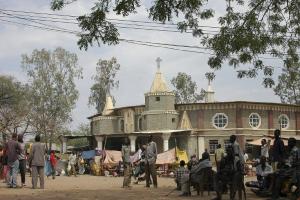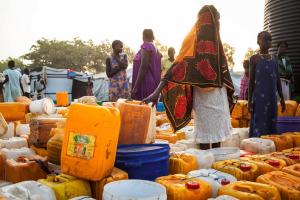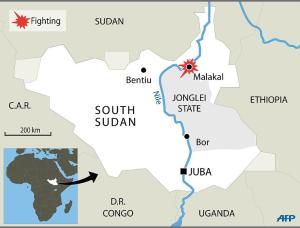Good
People,
Is Museveni
on the run.............??? South Sudan Government loosing contact with its troops
in Key town when Museveni troops are in the offensive in South Sudan backing up with the
Governement of Salva Kiir is hard to understand. There must be real fire out there. If only
Museveni paid attention and listened to the voices of reason, things would be different and calm
would be in the play in South Sudan.
in Key town when Museveni troops are in the offensive in South Sudan backing up with the
Governement of Salva Kiir is hard to understand. There must be real fire out there. If only
Museveni paid attention and listened to the voices of reason, things would be different and calm
would be in the play in South Sudan.
Judy Miriga
Diaspora Spokesperson
Executive Director
Confederation Council Foundation for Africa Inc.,
USA
http://socioeconomicforum50.blogspot.com
Diaspora Spokesperson
Executive Director
Confederation Council Foundation for Africa Inc.,
USA
http://socioeconomicforum50.blogspot.com
South Sudan loses contact with troops in key town
AFP
By Waakhe Simon Wudu
Wednesday, February 19th 2014-----------------1 hour ago
Juba (AFP) - South Sudan's army
said Wednesday that it had lost contact with its troops in the key oil
hub of Malakal following a major offensive by rebels.
The
rebels have said they now control the northeastern town after launching
an assault on Tuesday, throwing into doubt a ceasefire agreement signed
in Ethiopia last month.
"I
have no contact with the command in Malakal," army spokesman Philip
Aguer told AFP, as the independent radio Tamazuj said a top government
general had been seriously wounded in an attack reportedly involving
tens of thousands of rebel fighters.
"The oil wells are under the control of the SPLA (the South Sudanese army) and there is no fighting there," Aguer added.
According
to aid sources, Malakal's airport was closed on Tuesday evening and
rebels were inside the town -- although it was unclear if they had
gained total control over the dusty settlement on the banks of the White
Nile.
"There was the sound of
heavy shelling this morning and then sporadic shooting. It seems the
opposition control a part of the town and the airport, but the
government soldiers are still fighting," an aid source said.
"We
are in no position to confirm who is in control of Malakal town because
our people have not been able to get into town," said Joe Contreras,
spokesman for the UN mission in South Sudan (UNMISS).
Rebel
military spokesman Lul Ruai Koang said opposition fighters were
"chasing" government soldiers into the bush, and insisted that it was
government soldiers who attacked first and violated the truce.
The
United Nations said that 10 people had been killed on Tuesday in
"inter-communal clashes" within a peacekeeping base in Malakal, where
more that 20,000 people have been sheltering from the fighting, and that
more clashes broke out on Wednesday.
Rebel fighters have also been reported to be patrolling outside the UN camp, taunting people from rival ethnic groups.
View gallery

South Sudanese take refuge in the Malakal Catholic Church, as they flee fighting between rebels and …
"Both parties to this conflict must respect the inviolability
of the premises and facilities of the United Nations," UNMISS said in a
statement.
It stressed UNMISS's "impartial role in the current
crisis and its commitment to protect all civilians, whatever their
background".
The unrest in South Sudan has left thousands dead and
displaced 873,000 people, including tens of thousands who have crammed
into UNMISS bases in fear of ethnic attacks by either President Salva
Kiir's Dinka tribe or rebel leader Riek Machar's Nuer tribe.
South
Sudan is the world's youngest nation, having won independence from
Khartoum less than three years ago. The latest fighting erupted in the
capital Juba on December 15 but quickly spread across the country.
The
fighting around Malakal, the capital of Upper Nile state, appears to
have been the heaviest to take place since the government of President
Kiir and rebels loyal to former vice president Machar signed a ceasefire
agreement in neighbouring Ethiopia on January 23.
View gallery

South Sudanese women stand among water containers at the Tongping UNMISS (United Nations Mission in …
On Tuesday, however, Kiir
said he would continue to take part in ongoing but slow-moving peace
talks that are underway in Addis Ababa.
The UN appealed at the
start of the month for a colossal 1.27 billion dollars (925,000 euros)
to respond to the humanitarian crisis, but says it is still one billion
dollars short of the target
===================
===================
Israel Official: Africans Agree to Go to Uganda
JERUSALEM February 19, 2014 (AP)
By DANIEL ESTRIN Associated Press
Dozens of Africans have accepted an Israeli government offer to relocate
to Uganda, an Israeli official said Wednesday, part of the Jewish
state's efforts to cope with an influx of migrants from the continent.
The announcement came weeks after officials said a third country, which
they refused to identify, would soon begin to accept migrants who had
gone to Israel.
About 50,000 African migrants, mostly from Eritrea and Sudan, have
poured into Israel in recent years. The Africans say they are
asylum-seekers fleeing persecution and danger. Israel says they are job
seekers, but does not deport them because they could face danger in
their conflict-ridden countries.
The influx has caused friction with locals and alarmed authorities, who
say Israel's Jewish nature is threatened by the presence of the
Africans. But rights groups have said Israel has an obligation to
protect the migrants, in part because of Israel's history of taking in
Jewish refugees following the Holocaust.
The official said Israel paid $3,500 each in recent weeks to about 30
migrants who agreed to leave for Uganda. He spoke on condition of
anonymity because he was not authorized to speak to the media on the
matter.
Ugandan officials denied any deal was in place. "We are not privy to
such an arrangement," said David Kazungu, a Ugandan government
commissioner who is in charge of refugees.
Uganda has hosted hundreds of thousands of refugees over the years,
often women and children fleeing outbreaks of violence in neighboring
countries such as Congo and South Sudan. Uganda also has good diplomatic
relations with Israel and enjoys close security ties. Israeli
investments in Uganda include infrastructure development, water
management and agriculture.
Uganda's long-serving president, Yoweri Museveni, has been known to
exercise close control of the country's foreign and military policies,
often taking positions and signing deals without the knowledge of senior
government officials, technocrats, and even lawmakers.
If a formal or informal agreement was reached with Israel, one
independent lawmaker said, it likely involved Museveni or an official
very close to him.
Ugandan lawmaker Gerald Karuhanga urged Uganda's parliament to actively
investigate the allegations. "In case it is true, that would be a very
unfortunate mistake, because you don't know the kind of people you are
receiving in the country," he said.
Israel's Interior Ministry and the Prime Minister's office declined comment.
Israel has used financial incentives in the past to encourage other
African migrants to leave. In 2012, Israel paid South Sudanese migrants
to return to their country and told them they faced arrest if they did
not agree to do so. Israel has good relations with newly independent
South Sudan.
Last month, Israel began sending African migrants to a new detention
center in Israel's south. Daniel Solomon, a legal adviser for Israel's
Interior Ministry, said at the time the migrants would remain there
while Israel processes asylum requests, searches for other countries to
take them in, and offers migrants incentives to leave.
The new Holot detention center is meant to be an "open" facility, where
residents can come and go. But they must sign into the facility several
times a day and sleep there, making it impossible for them to stray far
away or hold jobs.
The Interior Ministry has begun issuing summons for people to report to
Holot when they try to renew visas that had previously allowed them to
stay in the country. The effort has started with young males who have
been in the country for the longest amount of time. Those who do not
comply face possible arrest and imprisonment.
Last month, African migrants staged a series of demonstrations in Tel
Aviv demanding they be recognized as refugees — a status that would give
them residency rights.
———
Associated Press reporter Rodney Muhumuza in Kampala, Uganda, contributed to this report.

No comments:
Post a Comment